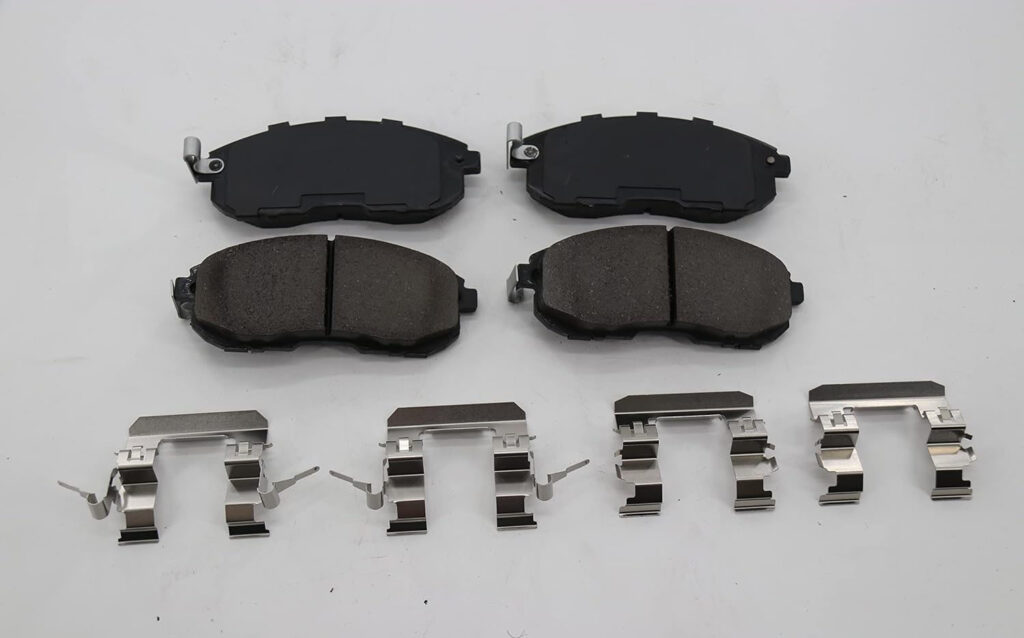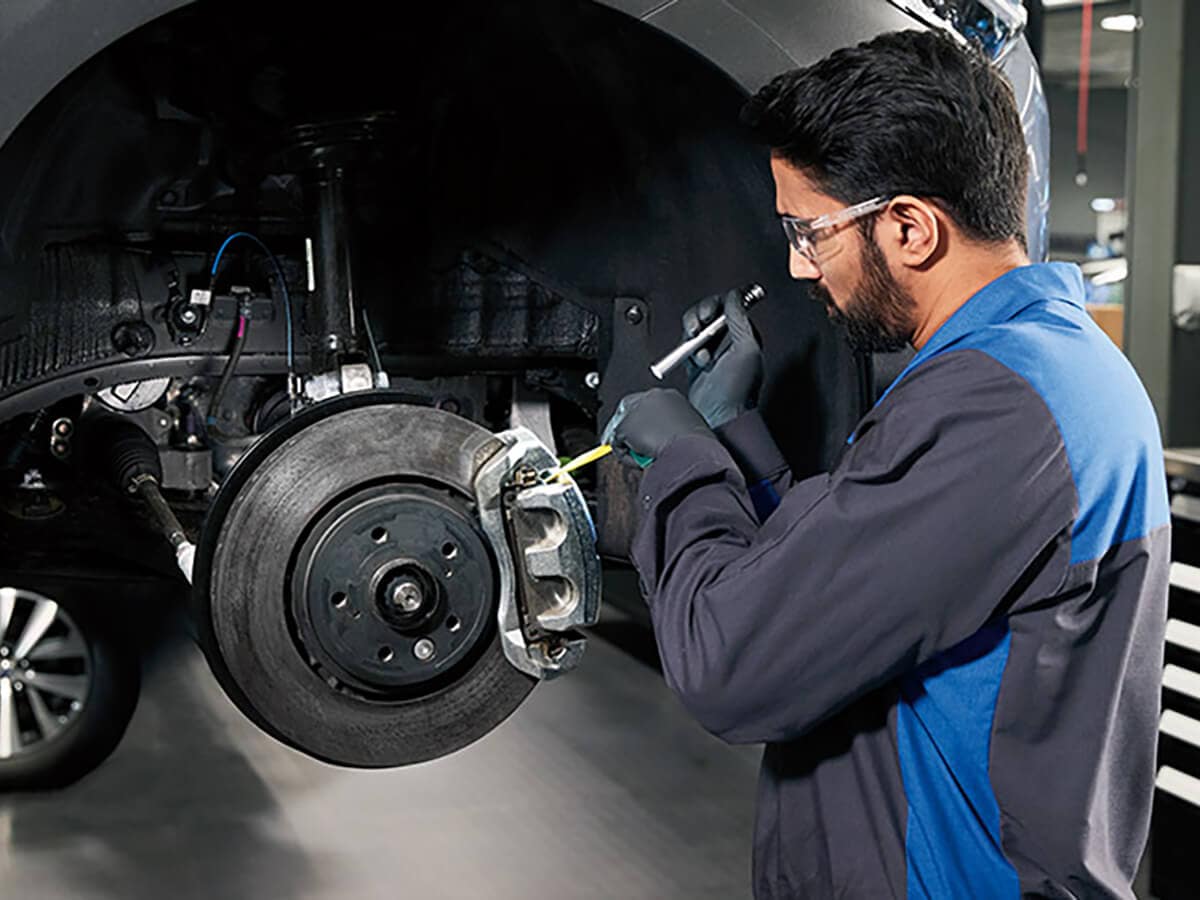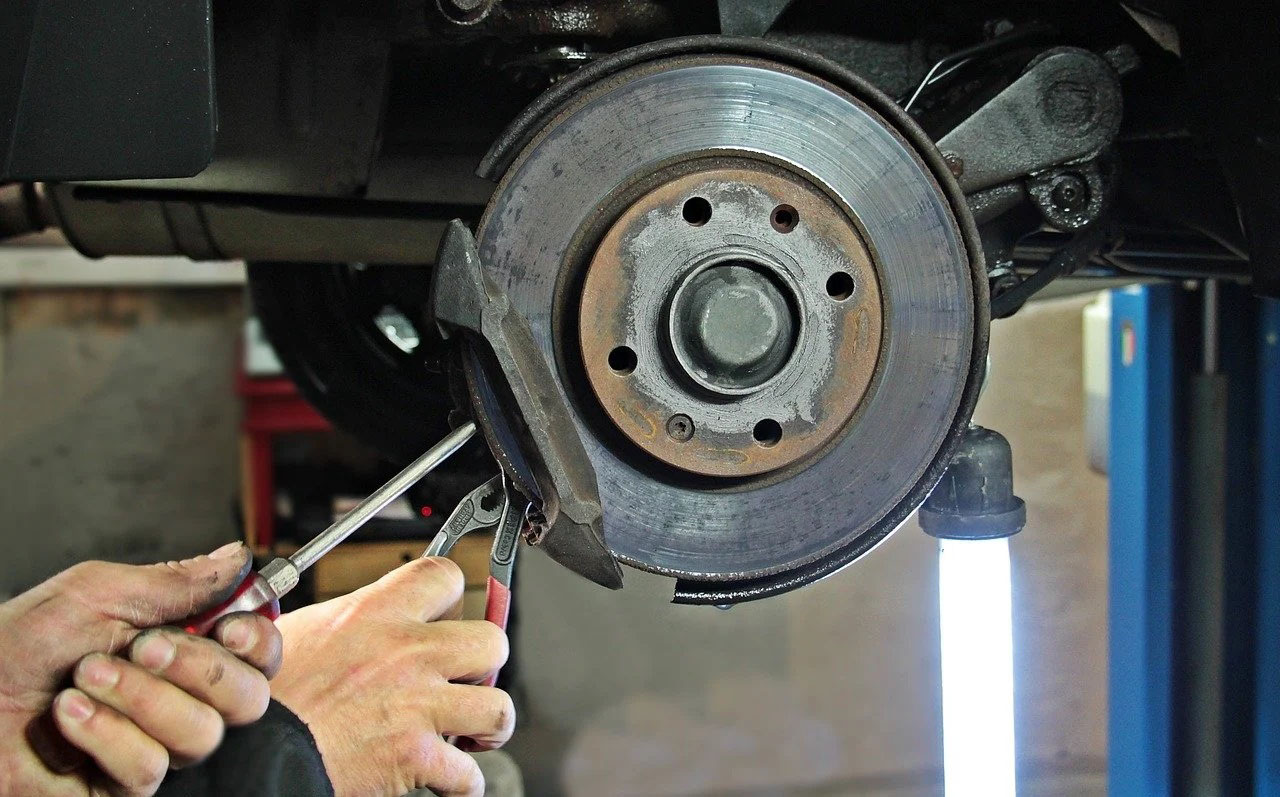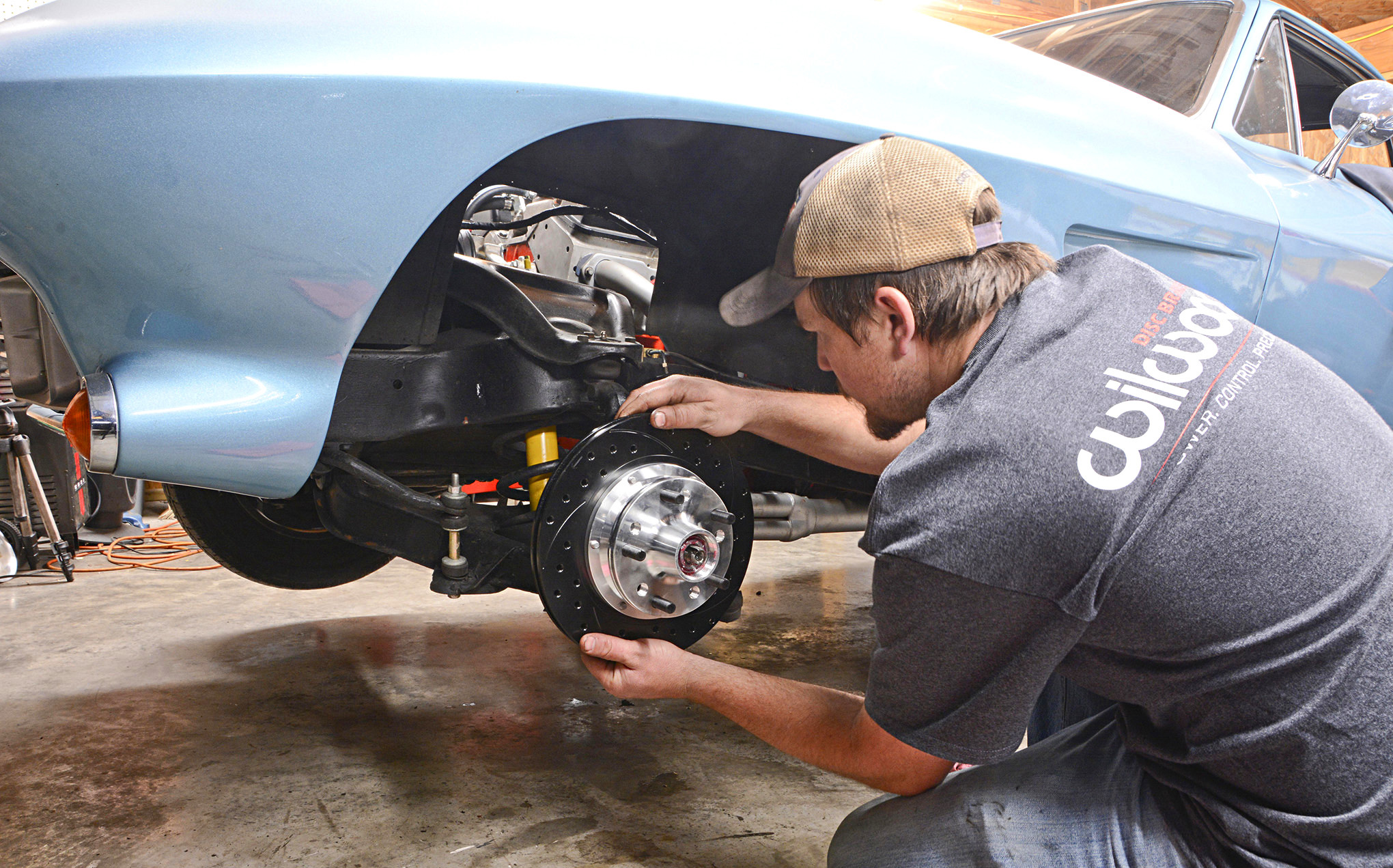Choosing the right brake pads can be tricky. One type you may consider is ceramic brake pads. This article will explore if ceramic brake pads are good for your car, detailing their benefits and drawbacks.
Let’s find out more.
Table of Contents
ToggleWhat are Ceramic Brake Pads?
Ceramic brake pads use a mix of durable ceramic compounds and copper fibers. This blend makes them different from standard metallic or organic pads in cars’ braking systems.
Composition and Materials Used in Ceramic Pads
Ceramic brake pads are made from a mix of ceramic fibers, fillers, and binding agents. These materials work together to handle the heat from braking better than other types. The ceramic compounds and copper fibers inside help pull the heat away from the rotor.
This keeps your brakes cooler and reduces wear on the system.
Ceramic brake pads offer improved longevity and less noise, making for a smoother ride.
From my own experience switching to ceramic pads, I noticed they produce much less dust. This keeps your wheels cleaner longer. They also last longer than standard metal-based pads, which means you save money over time.
Even in heavy traffic or sudden stops, these pads perform quietly and efficiently without the squeal common with other types.
How Ceramic Pads Differ from Other Brake Pads
Ceramic pads are made from a dense ceramic material mixed with copper fibers. This mix helps them handle high brake temperatures and reduces brake squeal. Other pads, like metallic or organic ones, use different materials.
Metallic pads have metal pieces in them, which can be louder and create more dust. Organic pads are softer and quieter but wear out faster.
Having used both types on your car, you notice ceramic pads last longer and keep your wheels cleaner than metallic ones. They also make your rides quieter since they don’t produce as much noise when stopping your vehicle.
But these perks come at a higher price compared to other pad types. Ceramic options provide smoother stops without the rough feel some metallic pads create during braking.
Pros of Ceramic Brake Pads
Ceramic brake pads offer clear benefits like making less noise and lasting longer. They keep wheels cleaner by producing less dust.
Reduced Brake Dust
Ceramic brake pads produce less dust than other types. This means your wheels stay cleaner for longer periods. The dust from ceramic pads is also not as sticky or black as that from metallic or semi-metallic brake pads, making it easier to clean off your car’s wheels.
Cleaner wheels can improve your vehicle’s appearance and reduce the time you spend washing them.
I switched to ceramic brake pads last year, and the difference in how much cleaner my wheels are is amazing.
Using these pads helps keep your car looking better without extra work. Plus, because the dust is lighter in color and doesn’t stick as much, it won’t stain your driveway or garage floor as badly if you do a lot of braking in one spot.
Longer Lifespan
Ceramic brake pads outlive both metallic or organic counterparts. Constructed with resilient materials such as fiberglass and Kevlar, they exhibit a slower wear rate. This indicates a less frequent need for replacement.
Drivers have seen these pads can withstand more miles without a drop in braking quality.
These brake pads also manage heat more effectively. Heat accelerates brake wear. Ceramic pads, however, excel at heat dispersal, maintaining an overall cooler system and contributing to the durability not just the pads but also the brake rotors.
While driving conditions can impact lifespan, ceramic variants consistently demonstrate extended use, translating to cost savings over time on upkeep and replacements for parts like calipers and disc brakes.
Quieter Operation
Ceramic brake pads make your rides quieter. Metal pads often cause a high-pitched noise when they touch the brake disc. Ceramic ones, though, are made of materials that cut down on this noise.
This is great for people who like calm drives without annoying sounds.
You might notice less squeaking from your brakes if you switch to ceramic. Many drivers share stories about how swapping to ceramic pads made their cars much quieter. This could mean more peaceful trips to work or around town for you too.
Better Performance in Most Driving Conditions
Ceramic brake pads give you excellent control and enhance stopping power in diverse driving situations. Whether managing slippery roads or moving through bustling city traffic, these pads assure consistent braking performance.
Owing to their heat dispersion properties, they function well at varied temperatures without compromising grip. That implies your vehicle is capable of managing unexpected stops and sharp turns more securely.
Equipping your vehicle with ceramic brake pads makes it prepared for nearly any road situation.
These brakes are also praised for their resilience under demanding conditions. When the brake pedal is pressed, friction produces heat. Ceramic materials, however, are excellent at swiftly dissipating this heat.
Thus, even during extended drives or heavy usage, these brakes remain efficient and responsive. This makes them not just perfect for daily travel but also for extended trips where dependability is crucial.
Cons of Ceramic Brake Pads
While ceramic brake pads offer several benefits, they come with downsides. They cost more than other kinds. They don’t work as well in very hot or cold weather. They might also wear out your car’s brake discs faster.
Keep reading to learn more about these points.
Higher Cost Compared to Other Brake Pads
Ceramic brake pads cost more than other types like metallic or organic ones. This is because their materials and the process to make them are more expensive. Your car uses these pads every time you slow down or stop, so they are important for safety.
The price can be a big factor when you choose brake pads.
People who have used ceramic pads note that even though they pay more upfront, they save money over time. They do not wear down quickly like cheaper options. This means less frequent replacements and savings on labor costs at your local garage.
So, you might spend more at first but could save money as you drive your vehicle longer.
Less Effective in Extreme Temperatures
Ceramic brake pads face challenges in very hot or cold weather. Their heat dissipation is not as good as metallic pads. This means they don’t work as well when it gets really hot, like during hard driving or in racing conditions.
In extreme cold, they also might not perform to the best of their ability right away. You need them to reach a certain temperature before they can grip the road properly.
You might notice this if you drive your vehicle hard on mountain roads or if you live where winters are harsh. Your brakes could feel less responsive until they warm up. This happens because ceramic materials handle heat differently than metals used in other types of brake pads, affecting their performance across different temperatures and driving scenarios.
Potential for Faster Rotor Wear
Ceramic brake pads can cause your car’s rotors to wear out more quickly than if you use other types of pads. The material in ceramic pads is harder than the metal in rotors. Because of this, the rotor might lose surface over time.
This means you may need to replace or service your vehicle’s rotors sooner.
Using ceramic pads impacts how often you check and maintain your car’s brakes. You should keep an eye on your brake system’s overall health, including tire pressure monitoring and suspension checks.
Being proactive can help manage wear and keep your vehicle running smoothly.
Best Use Cases for Ceramic Brake Pads
Ceramic brake pads work best for certain types of drivers and vehicles. If you drive every day or have a car that needs quiet and clean brakes, ceramic options could be right for you.
Daily Commuters and Passenger Vehicles
For daily drivers and those in passenger cars, ceramic brake pads offer big perks. You get a smoother ride because they make less noise than metallic or organic options. Your car stays cleaner too, since these pads cut down on brake dust.
This means less time spent washing your vehicle and more time enjoying the drive.
If you use your car for getting to work or running errands, consider ceramic pads for their longevity. They won’t wear out as quickly as other types, saving you money on replacements over time.
Plus, they handle the heat from everyday braking well, keeping your rides safe and comfortable without wearing down your rotors too fast. Ceramic brake pads are smart picks for most driving conditions outside of extreme sports or heavy-duty use.
Low-Dust and Low-Noise Environments
Ceramic brake pads shine in places where keeping things clean and quiet matters. Offices, hospitals, and schools need low dust to keep equipment and air quality better. Ceramic pads reduce brake dust, so your car’s wheels stay cleaner longer.
This means less time spent washing your vehicle or worrying about harmful particles from the brakes affecting those around you.
They also make driving smoother by cutting down on noise. If you live in a quiet neighborhood or park in an enclosed space like a garage, you’ll appreciate the reduced noise when coming to a stop.
Using ceramic brake pads helps maintain a peaceful setting by avoiding the loud screeches often associated with other types of brake materials. Your tire pressure monitoring system (TPMS) will work just fine with these pads, ensuring tires stay at the right pressure for safe driving without adding unwanted sounds.
Not Recommended for Heavy-Duty or Racing Applications
Ceramic brake pads might not suit heavy-duty trucks or race cars. These vehicles need brakes that can handle extreme heat and stress. Ceramic pads work well for daily driving but lose grip under harsh conditions.
This makes them less reliable for demanding activities where stopping power is critical.
For racing, metallic or carbon-based pads are better. They withstand high temperatures during fast laps on a track. Heavy-duty vehicles also benefit from these tougher materials. They endure the strain of carrying heavy loads without wearing down quickly.
So, if you own a truck used for towing or a car designed for speed, consider other types of brake pads for safety and performance.
Conclusion
Ceramic brake pads offer many benefits, such as less dust and noise, a longer life, and good performance in most driving situations. They cost more than other types of brake pads and may not work as well in extreme cold or heat.
They can also wear down your car’s brake discs faster. If you drive every day or want a quiet ride with less mess, ceramic pads are a great choice. But for very heavy cars or racing, they might not be the best pick.
Think about what you need from your brakes before choosing ceramic pads for your vehicle.
FAQs
What are the benefits of using ceramic brake pads?
Ceramic brake pads offer several advantages including longevity, reduced noise during braking, and improved vehicle performance.
How do ceramic brake pads compare to metallic ones?
When compared to metallic brake pads, ceramic options often provide better heat conductivity, which can enhance overall automobile performance. They also tend to create less dust and noise.
Are there any specific vehicles that benefit more from ceramic brake pads?
While all types of vehicles can use ceramic brake pads, they’re particularly beneficial for high-performance cars due to their superior heat conductivity and durability.
Is it worth investing in ceramic brakes for my car maintenance?
Yes! Ceramic brake pads are known for their longevity and consistent performance over mileage which makes them a worthy investment as part of your car maintenance routine.
Can I upgrade my current drum brakes with ceramic ones?
Absolutely! You can upgrade your existing drum brakes or advics with new lug nuts and lubricant along with the installation of quality ceramic brakes for enhanced vehicle safety and performance.




